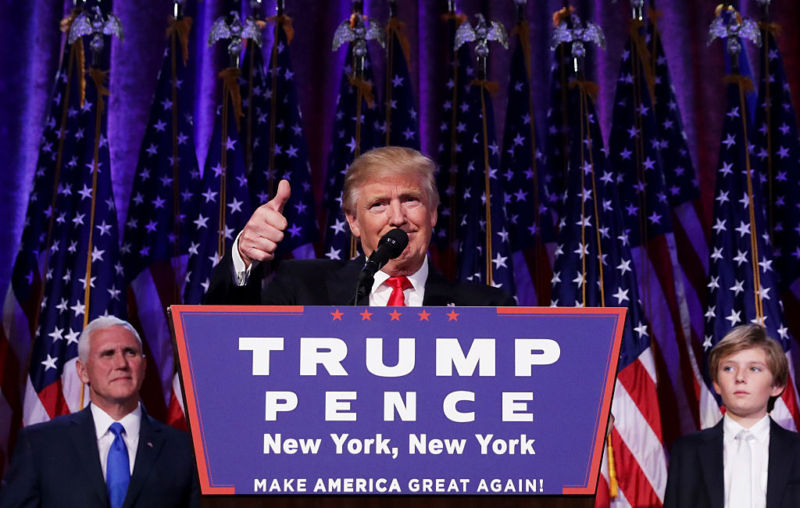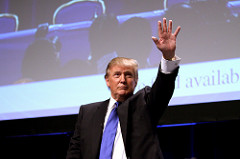100 days of Trump: Tackling Corruption
 https://cdn.arstechnica.net/wp-content/uploads/2016/11/trump_win-800x508.jpg
https://cdn.arstechnica.net/wp-content/uploads/2016/11/trump_win-800x508.jpg
President-elect, Donald Trump has released an action plan to “make America great again”outlining his goals for his first 100 days in office. He calls it his contract with the American people and promises to restore honesty and accountability. The plan is divided into sections; addressing corruption in Washington D.C., protection of American workers, restoration of the rule of law, and specific motions to address in Congress. I’m going to be writing four articles looking at his plans and their implications. This article will focus on Trump’s first broad goal, addressing congressional corruption in Washington through six main points.

First, he wants to limit congressional terms. The implications of this regulation are unclear because he does not outline the length of the limits. If term limits are too long, little will change; if they are too short, the turnover may make it difficult for Congress to be consistent. We may also lose experienced politicians who are vital in helping new officials learn the ropes and overcome the steep learning curve associated with Congress. At the end of the day, Congress was not intended to be a career; it was about civic duty. Today, most Americans feel that politics is not a career and that elected officials should have some level of non-political work-experience. Implemented correctly, term limits would reduce the influence of lobbyists, corporate sponsors, and special interest groups so that politicians could better represent their constituents. It would also increase the power of newly elected politicians, as lobbying groups and sponsors often favor incumbents, making it hard for new people to run. However, not every career politician is corrupt, and this may force valuable and experienced officials out of office. In any case, introducing congressional term limits would require a constitutional amendment as it involves altering the structure of the House and Senate. Considering Congress is the target of this proposal, it is unlikely it will pass and Senate Majority Leader, Mitch McConnell, has already said he would not support this. The plan has the potential to change how Congress works for better or for worse, but we must wait to see how, if at all, it will be implemented.
Second, Trump wants to institute a hiring freeze on federal jobs excluding those in the public health, safety, and military sectors. While this aims to address corruption, it is unlikely that it will accomplish that goal. In reality, it would reduce spending and cut jobs. While reducing spending is a goal of the Trump administration, getting rid of well-paid government jobs for hard-working people seems counterproductive. This would also increase bureaucratic inefficiency rather than improve it. There will be fewer people to accomplish the same number of tasks and some departments could become quickly overwhelmed. Many government agencies, such as the IRS, process millions of people each year and already struggle to keep up with the demand. In addition, the growth of federal jobs is disproportionate to the growth rate of the population and total jobs, with the population growing at a rate of 67 percent and federal jobs at 10 percent since the 1960s. However, as calls for reducing the federal workforce through attrition have been supported by the Republican Party in the past, this plan could become a reality. Trump shows a lack of understanding of the vital jobs that federal employees perform and the realities of government bureaucracy. A hiring freeze would likely result in greater frustrations for the average American.
Third, for every new regulation, two must be eliminated. I understand that this is to reduce the number of federal regulations, but this could also be used to target specific regulations put in place by Democrats. With a Republican-controlled Congress and White House, a consensus will allow many bills and regulations to get passed, and, as a result of this requirement, they may be forced to cut useful regulations. On the other hand, Republicans have long opposed government regulation and it is unlikely that they will introduce many more. Rather, they will be happy to repeal those that already exist. Inferring from Trumps other policies, this would likely involve targeting environment, corporate and banking regulations, among others. They will likely cut EPA power plant regulations calling for carbon emissions to be cut by 30 percent. It may also enable the Trump administration to take on net neutrality and reverse the Federal Communications Commissions ruling. While we should reduce regulations, a hard line regulation does not seem the best way to accomplish it and it will probably be used to undo a lot of what Obama has worked toward in the past eight years.

Fourth, Trump wants to introduce a five-year ban on federal officials becoming lobbyists. This would further reduce lobbyist influence as nearly half of Congress become lobbyists and use their influence and connections to affect policies and further personal agendas after leaving office. Furthermore, these laws often have popular support, but it is unlikely Congress will prioritize them because they threaten their own jobs. Yet, many people are concerned about the so-called “revolving door,” where the private sector and government officials are closely linked. Donors give money and other incentives to further their own agenda, causing officials to forget the beliefs and ideals of the people who voted them into office. This seems like a legitimate attempt to reduce corruption and may prove to be beneficial for the way Congress is structured, but it is unlikely to come to fruition.
Finally, he wants to ban White House officials lobbying on behalf of a foreign government and foreign lobbyists raising money for American elections. These two points aim to reduce the effect of foreign governments on the U.S., however this is ironic considering his campaign has been associated with foreign officials. Paul Manafort, his former campaign manager, left the campaign after reportedly having ties to politicians in Ukraine. This is reminiscent of other hypocrisies in the Trump campaign; the man himself has previously supported Hillary Clinton and was the sort of wealthy sponsor he complains about. There is little empirical evidence on how much foreign investors influence U.S. elections, but I can understand how this sort of behavior could be concerning. It also makes sense as a Trump policy when you consider his turn to isolationism and distrust of foreign governments, but I doubt it would be largely effective in fighting corruption. These points would also need to go through Congress to go into effect. It would probably not be a priority because it further regulates congressional officials, and is not a plan widely championed by the Republican Party. Regulations on foreign officials would probably not have far-reaching implications and will likely fall by the wayside as other things are prioritized. The effort involved in putting this through Congress would likely not be worth the potential benefits.
Most of Trump’s plans seem like quick attempts to fix complex issues that will likely fail or create new problems. Regulations on foreign officials do not seem particularly useful. A hiring freeze and the regulation rule seems incredibly misguided and unnecessary. Only congressional limits seem like they could have a positive effect, but even that is uncertain. Trump’s plan to clean up Congress seems like a step in the right direction in few respects, and appears dangerously uninformed in others.
Trump’s goal to take on corruption is only the first part of his greater plan to change America. His next priorities are the protection of American workers and restoration of constitutional rule of law. Both of these titles are open to interpretation and appear to be created to appeal to those who elected him. I will be addressing them in following articles.
